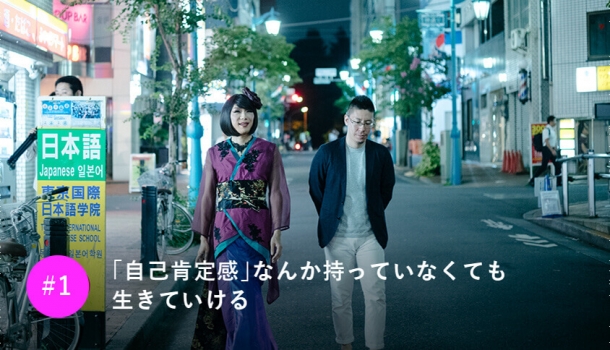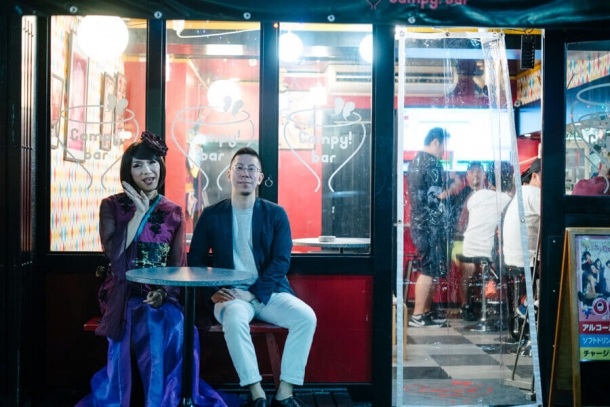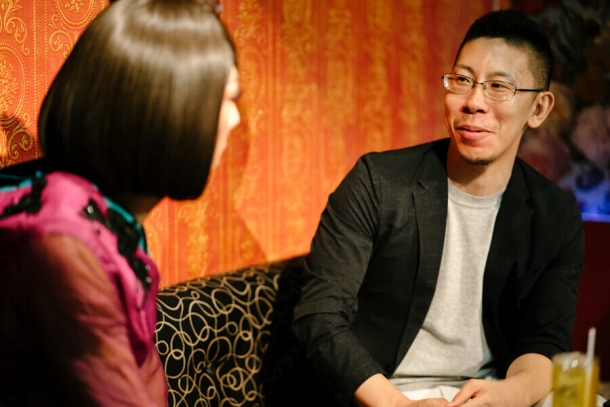We met with Bourbonne, Waseda alumnus, frequent television guest, and moderator of Japan’s largest sexual minority festival, Tokyo Rainbow Pride, and Associate Professor Noritaka Moriyama from the Faculty of Letters, Arts and Sciences. In the second part of this special, featuring these members of the sexual minority community, we follow up on our previous discussions on LGBT terminology, the LGBT media “boom,” and the relationship between the gay community and portrayals of erotica, to learn about the interviewees’ personal history and their feelings of self-affirmation.
With the rise of “onee talent,” and the popularity of television shows like What Did You Eat Yesterday? (TV Tokyo) and Osan’s Love (TV Asahi), we look back on the lives of our two guests and learn about their views on the LGBT community’s social perception.

#1 You can Live Without “Self-Affirmation”
Q. When you were students, were you troubled by feelings regarding your sexuality?
Moriyama
For whatever reason, I wasn’t troubled by my sexual identity when I was younger. For this reason, I never had an experience in which I felt I “overcame” some obstacle regarding sexuality.
Bourbonne
So you didn’t view your identity as a gay man negatively?
Moriyama
That’s correct.
Bourbonne
I didn’t view myself negatively, but because I was living in the Gifu countryside, where I didn’t know of any older gay people, I had a vague feeling of anxiety that made life difficult.
But once I entered high school, I found out about gay magazines and learned there were many others like me. This put me at ease.
Q. So, in a way, learning through magazines that there are others with the same sexuality as you saved you.
Bourbonne
There was no internet back then and it was impossible to know how many people out there were like you. There are many in my generation who felt there was something wrong with them.
Q. Even today there are many students who feel that something is wrong with them, worry they’re alone, and worry how society perceives them. Some of these students come to Waseda’s GS Center (https://www.waseda.jp/inst/gscenter/) to request assistance in addressing these anxieties. How do you think people should overcome these negative feelings?
Bourbonne
For me, the number one thing that changed me was my own personal experience. I moved from the countryside to Waseda and saw around a thousand gay people joyously dancing at a gay event. Then, the gay people who used to sneak into bars in Ni-chome started walking around more openly. 20 years ago, Aki-san, a legend of Ni-chome, launched the Tokyo Rainbow Festival*, of which he was the first moderator. A sexually diverse crowd flooded the streets and surprise fireworks filled the skies above Ni-chome. At that moment, I broke down in tears, feeling we had entered a momentous turning point.
*Organized by the Shinjuku Ni-Chome Promotion Association, this city parade consists of various performances in a restaurant and drinking district. Taking place every summer, the event held its 20th iteration in August 2019.

Caption: “Mix bar” Campy! bar, produced by Bourbonne and open to all people regardless of their sexuality.
Reading up on material is important, but it’s also important to get out there and experience things for yourself. Perhaps the best way to change how you feel is to get out there and participate.
Moriyama
My job at university is to impart knowledge and logic. Knowledge is important because it protects you from attackers. In other words, it is important to arm yourself with knowledge.
Bourbonne
Those without power, or who lack knowledge, can’t protect themselves when someone tries to trip them up.
Moriyama
However, I don’t think this necessarily leads to self-affirmation, nor do I think it has to. I don’t think the purpose of sharing knowledge and imparting logic is to coerce students to affirm themselves. As shown in Bourbonne’s recollection, people may attain self-affirmation in a gradual way, while others may attain it suddenly. I don’t think one can attain self-affirmation just by arming themselves with knowledge.
Bourbonne
That’s right. People don’t learn to love themselves by reading a dense book, but by being embraced and told they’re beautiful by someone they love. This applies to everyone, not just sexual minorities.
Moriyama
There are people like me who can attain self-affirmation on their own by reading a “dense book,” and I feel close to students that can do that, but I wonder if self-affirmation is necessary in the first place. There are a lot of students who, when they hear about “success stories,” assume they can’t be happy unless they learn to accept and convince themselves there’s nothing wrong with them. As a result, many of them ask how they can achieve self-affirmation. But whether its heterosexuals or cisgender people (people whose sense of personal identity and gender corresponds with their birth sex), people from all walks of life live while thinking their deficient in some way.
 I think it’s okay because people can live without self-affirmation. It’s a burden to obsess yourself with the idea that you need to learn to accept yourself. I want to tell students who feel they can’t accept themselves that “I don’t think you need to become an amazing person, nor do I think you need to be in order to be happy. You don’t have to be amazing.”
I think it’s okay because people can live without self-affirmation. It’s a burden to obsess yourself with the idea that you need to learn to accept yourself. I want to tell students who feel they can’t accept themselves that “I don’t think you need to become an amazing person, nor do I think you need to be in order to be happy. You don’t have to be amazing.”
Bourbonne
It’s a weird paradox, because self-affirmation includes the acceptance of one’s deficient attributes.



